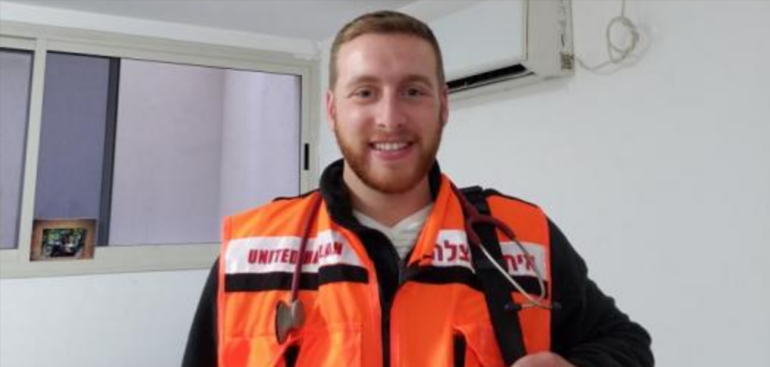
Orthodox Jewish Teen Saves Life During Marathon, Then Discovers Shocking Holocaust Connection
It’s not everyday that a teenager saves someone’s life, let alone in the middle of a marathon. But in 2014, that’s exactly what Akiva Pudell did, who was a senior at MTA yeshiva high school at the time. From a Modern Orthodox family in Teaneck, New Jersey, Pudell was already trained as an EMT before the age of 17. “The [MTA] hockey team wanted to do a chesed and also keep everybody in shape. So we raised money for Chai Lifeline, we were going to run the Miami half marathon.” Having already run the same race in his junior year, Pudell expected his senior year experience to be more of the same.
“It was a particularly humid, hot day. About three-quarters of the way through, I hear someone say that someone fell…someone probably got dehydrated. Not a problem. But something in the back of my mind said ‘you’ve gotta look.'” Pudell saw a guy laying in the street. “I turned around, ran back, and sensed that it was something a little more serious.” While there were thousands of runners, this man in his mid-fifties had been running closely behind Pudell. “The guy was not breathing. He didn’t have a pulse. I immediately asked for whatever medical equipment they had. Fortunately there was a defibrillator nearby.” The marathon staff provided Pudell with everything that he needed. Soon, the police came to assist as well. “We [did] a round of CPR and automatic shock. The guy ended up coming through. The ambulance came, took him back and I finished the [13.1 mile] race.”
Pudell didn’t realize he was now a hero. “A guy came up to me and said ‘By the way, you just saved that guy’s life.’ I had no idea. I just continued running. To me it was just another call, one of the thousands I’ve been on. It had no real impact at the time.” “Your mind and your training kicks in and it becomes second nature. You just go through the progression of all the things you’re taught.” Pudell was taught to always “see where you can be the helping hand.” His parents’ inspiration was at the forefront. “This is what I’m here for. I was trained in order to help. When those opportunities come about, I’m not going to shy away.”
The story was written up in the New Jersey Jewish Link, and then a few months after the marathon, Pudell received a phone call from a Florida number. “A guy says to me, ‘Is this Akiva?’ The guy introduced himself as Erwin Hogeweg and said, ‘I think you’re the guy that saved my life. It’s all fuzzy. I only remember waking up in the ambulance. Can you fill in some details?'” The man was not Jewish, but had been pointed to the Jewish Link article by a friend who recognized the details of the story. Erwin sent Pudell a letter thanking him, and Pudell moved on. He spent his gap year in Israel, joined the Israeli army and made Aliyah. He is now an EMT for United Hatzalah Israel, a student at Bar Ilan University, and is applying to medical school.
Pudell was trying to think of a story to write about for his med school application essay. “This was the one I pointed to, this was it. It happened to be right before Rosh Hashana.” Pudell was in Florida at the time and reached back out to Erwin, sending him good wishes. Erwin emailed him back right away, asking to meet. “He said, I have a story to tell you.”
It turned out that Erwin was from Amsterdam and had been living in the states since 2000. Six years after he came to the U.S., Erwin had attended a theatrical production that his daughter was in. During intermission, he was frantically called to come backstage. “He said, ‘there was an elderly woman there, and the woman said ‘Are you Erwin? Do you know this name?’ Erwin said, ‘Yeah, that’s my grandfather.'”
During World War II, when the Nazis occupied Amsterdam, Erwin’s grandfather and his brothers took in children from a Jewish family, and each brother hid one sibling through the war. This woman explained that she was the child Erwin’s grandfather had hidden. Because of Erwin’s grandfather’s tremendous bravery and sacrifice, her life had been saved. The survivor saw Erwin’s last name in the playbill (she had a grandchild in the play) and immediately got out of her seat to search for the person who bore that name. She explained that she was about to move back to Europe permanently, and it didn’t escape either of them that the chances of two Europeans meeting at the same school play in Florida 60 years after the war was quite miniscule.
After the marathon, when Erwin and his wife read about how a Jewish boy had saved Erwin’s life, his wife made the connection. She said to Erwin, “Your grandfather saved a person’s life, 70 years ago. And you were paid back. She doesn’t believe in coincidences and said that good things lead to good things.” Because Erwin’s grandfather saved a Jewish life long ago, he merited to have a Jew save his life.
The outpouring of interest and encouragement from his story has been far-reaching and a light to the whole Pudell family. Now, Pudell wants to become an emergency specialist. He realizes that these fast life-saving encounters of an EMT or ER doctor aren’t just fleeting, transactional instances. “There are a few moments, things like this, that really impact and leave that mark and remind me why I want to do what I want to do full-time.”
If you found this content meaningful and want to help further our mission through our Keter, Makom, and Tikun branches, please consider becoming a Change Maker today.







